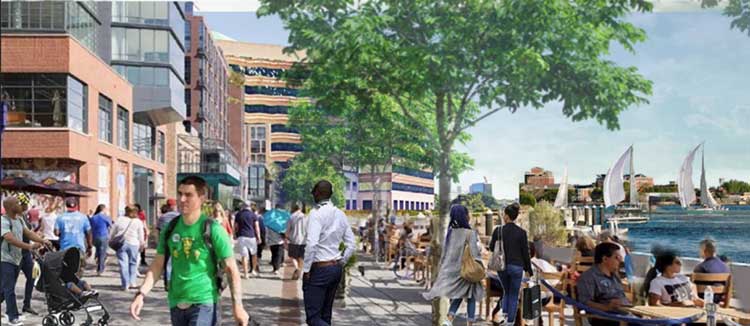New Haven’s Long Wharf sits at the confluence of water, rail, and highway access to the City. Historically an industrial area, the Long Wharf is the City’s doorstep from I-95 and the waterfront, providing a “first impression” of Downtown New Haven. While the 352-acre District is already a vital job generating mix of retail, hotel, office, industrial, and entertainment uses, including the acclaimed and award-winning Long Wharf Theatre, the area is highly underutilized and has the potential to be a much more significant economic driver in the City as a Transit Oriented Development.
RESGroup, together with a team of architects and engineers, created a responsible growth plan (the “Vision Plan”) for the City of New Haven to facilitate new development and support the existing uses within the Long Wharf District. The Vision Plan addresses floor management issues with future land use, calling for a mix of office, medical office, residential, public market, hotels, parks and entertainment, and allows increased density on the underdeveloped sites. Together, these factors will create a more vibrant and resilient waterfront neighborhood, and increase tax revenues to the City. RESGroup completed the market analyses for these wide-ranging uses to guide building typologies utilized in the Plan.
In order to attract developers, the Plan calls for Public “enabling projects” such as parks, storm water improvements, and other infrastructure enhancements to improve the character and quality of the neighborhood to potential workers, residents, and tourists. To understand the potential gap in funding these enabling projects, RESGroup analyzed the real estate taxes that could be generated by the project in 10 and 20 years to provide guidance on public financing strategies, such as the use of Tax Increment Financing (or “TIF”) to fund early-on public improvements to the District. This analysis was completed for the proposed Vision Plan and compared to the “No Build” results if the Vision Plan and enabling projects did not occur, to illustrate the need for public funding to attract private investment.
As the under-developed sites are owned by a diverse group of property owners, the public-sector has limited control over the future pace of development. However, the Long Wharf Responsible Growth Plan will provide a guide for future private development and identifies the public infrastructure, parks and water/resiliency features need to create a more cohesive link with the surrounding properties and community.
To date over $200 million in public funding has been invested in waterfront resiliency and infrastructure projects in the area, and the adaptive reuse of the former Pirelli Tire Building as the 165 guest room, net-zero energy Hotel Marceau opened in May 2022. Further, 500 residential units have been approved on a vacant waterfront site.
